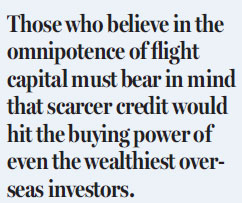Global liquidity tightening could bring more than ripples

Some market commentators see property, share bull-run continuing but Peter Liang warns against underestimating effect of higher credit costs
The unwinding of the United States Federal Reserve's balance sheet has many Hong Kong investors asking if that means the beginning of the end, or the end of the beginning, of the liquidity-driven stock- and property-market boom.
This is the question that has brought forth quick and immediate responses from stock punters and property agents who tried to assure doubters that they ain't seen nothing yet. For instance, a veteran stock commentator, widely known as Uncle Luk, told a mass-circulation daily newspaper that the Fed's announcement about its unwinding program has "removed all the uncertainties" overhanging the stock market, clearing the way for the benchmark index to scale new heights.
His intensive euphoria was shared by Shih Wing-ching, founder and chairman of Centaline, one of Hong Kong's largest property agents. In the same newspaper article, Shih was quoted declaring that the property and stock markets are warming up for an even bigger boom than the one people are seeing.
Many more investors are not so sure of that. What has become certain from the Fed's unwinding schedule and its latest interest-rate forecast are that the plentiful supply of cheap credit is ending and borrowing costs have bottomed out. With the two major driving forces behind the latest stock and property rally gone, investors are asking what is there to keep the good times going.
It's not just the US central bank that is reversing the loose money policy of the past nine years. The strengthening of the economies of major European Union member states has prompted the European Central Bank to consider a tighter monetary policy. The exchange rate of the British pound has surged against other major currencies after the United Kingdom's central bank indicated its intention to raise interest rates.
None of these are fazing the market bulls who have much at stake in the price rally continuing. They bank their hope on the continuous inflow of overseas, particularly Chinese mainland, flight capital, snapping up Hong Kong assets at almost any price without paying regard to economic fundamentals.

Cheap and readily available credit from banks and finance companies has let many Hong Kong people join the buying frenzy, plunking down millions of borrowed funds to buy apartments that provide individual living space that is below the standard set for government-built low-cost homes. Even subsidized public-housing units sold to needy families have become commodities for speculation in this crazy market.
As such, prices of assets in Hong Kong have gone completely out of line with their underlying values. The government has repeatedly warned prospective homebuyers to beware of rising borrowing costs. But its advice has largely fallen on deaf ears.
Nobody wants to talk about the so-called day of reckoning, when the average price of assets will start to converge with their underlying values. But recent changes in the macro-economic environment and government monetary policies are setting the stage, laying down conditions for a return to normalcy where economic fundamentals count.
For Hong Kong, public confidence in the government's housing policy - more particularly, its perceived ability and political will to solve the housing shortage problem in Hong Kong - is building up now. Some of the latest measures, including the creation of shared housing for the relief of up to 1,000 needy families, have helped reassure the public of the government's commitment and willingness to explore innovative and practical approaches to tackling what is basically a long-term problem.
Irrespective of what Shih, Uncle Luk and others are trying to say, the combination of rising borrowing costs, tighter credit and a positive government housing policy are expected to bring some sanity back to asset markets. Those who believe in the omnipotence of flight capital must bear in mind that scarcer credit would hit the buying power of even the wealthiest overseas investors.
Indeed, investors are asking the right question. This could be the beginning of the end of the long bull-run in asset markets.
The author is a veteran market commentator.
(HK Edition 09/25/2017 page10)
Today's Top News
- President Xi to deliver New Year's message to ring in 2026
- Xi's diplomacy in 2025: Shedding light on a world at crossroads
- China to apply lower import tariff rates to unleash market potential
- China proves to be active and reliable mediator
- Three-party talks help to restore peace
- Huangyan coral reefs healthy, says report






























